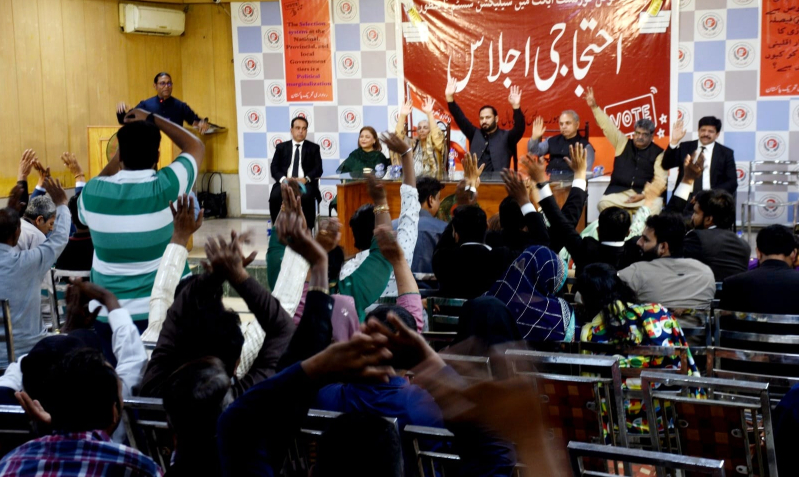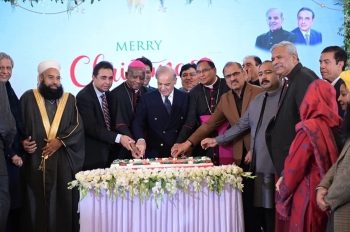
Christians in Punjab, Pakistan’s most populous province, are protesting a new local government election law that denies religious minorities the right to directly elect their own representatives and undermines democratic participation through non-party elections.
The Punjab Local Government Act 2025, which will govern long-delayed local polls expected in late December, requires residents in more than 4,000 union councils covering rural and urban areas to directly elect nine general members but fills four reserved seats — for minorities, women, laborers or farmers, and youth — through a party-driven “selection” process. Christians, who constitute the bulk of minority population in Punjab, argue that the change entrenches political marginalization for already vulnerable groups and violates constitutional guarantees of equality and local empowerment.
“Our biggest concern is the undemocratic and unfair adoption of the selection system on the reserved seats. The right to elect one’s own representatives is fundamental to meaningful participation,” said Samson Salamat, chairman of Rwadari Tehreek (Movement for Equality).
We fear that it will deepen the political marginalization of the weaker segments of society, especially religious minorities, women and labor, he added.
Addressing a “people’s assembly” organized at the Lahore Press Club on Nov. 7 in partnership with two other civil society organizations, Salamat said that holding the election on non-party basis would also undermine political representation.
“The Punjab Local Government Act 2025 is against democratic principles and will lead to a lack of accountability and transparency. Without a party affiliation, voters won’t know what policies or principles their local candidates stand for,” he emphasized.
Katherine Sapna, executive director of the paralegal organization Christians True Spirit, said Article 140-A of Pakistan’s constitution guarantees administrative, financial and political authority to elected local government representatives. The new law, however, undermines those protections and runs counter to core democratic values and constitutional guarantees, she argued.
“The representation of religious minorities in the form of proportional representation in the national and provincial assemblies since 2002 has already proved to be counterproductive for religious minorities. Instead of reforming the law, the Punjab government has repeated the injustice and deprived Christians and other minorities of electing their own representatives even at the local government level,” she said.
She added that Rwadari Tehreek, Christians True Spirit and the Human Friends Organization jointly filed a constitutional petition in the Lahore High Court on Nov. 5, asking the court to amend the law so religious minorities can directly elect their own representatives.
Other speakers — including church leaders, lawyers and social activists — also condemned the new law and called for direct elections to the reserved minority seats. Local government polls, they said, must reflect justice, equality and genuine public participation if religious and social minorities are to feel empowered at the grassroots level.
Punjab last held local government elections in 2015.
The practice of filling reserved seats through party nominations stems from the joint electorate model introduced by former military ruler Pervez Musharraf in 2002. Under that system, minorities vote alongside Muslims to elect national and provincial representatives, while minority seats in parliament and the provincial assemblies are distributed to political parties in proportion to their vote share, provided they secure at least 5% of the seats.
Ejaz Alam Augustine, a former Punjab minister for human rights and minorities affairs and current member of the provincial assembly, said that repeated efforts to reform the system for election on minority seats had failed to yield results.
“Power should be devolved to the grassroots level, particularly for minority communities, to effectively address the problems they face on a daily basis. However, successive governments over the years have avoided reforming the law, depriving minorities of their right to elect their own representatives,” he told Christian Daily International.
Under Article 51(4) of the Constitution of Pakistan, 10 seats are reserved for non-Muslims in the National Assembly of Pakistan, which has a total of 336 seats. Under Article 106, the four provincial assemblies collectively reserve 24 seats for non-Muslims (out of a total of 749). In addition, minorities are allocated four seats in the Senate of Pakistan (one per province) in its 96-member chamber.
According to Azam Mairaj, the founder of minority-rights advocacy group Tehreek-e-Shinakht (Movement for Identity), the 34 reserved seats in the national and provincial legislatures meant little for minorities when they did not elect their own representatives.
The current electoral system, he argued, has produced “factotums” beholden to mainstream political parties rather than accountable to the minorities they are meant to represent.
Advocating for direct elections to reserved seats, Mairaj proposed a model in which every non-Muslim citizen would retain the right to vote and contest general seats at the national, provincial and local levels, while also electing their own representatives to minority-reserved positions.
“The basic mechanism for dual voting should allow non-Muslim citizens to directly elect their representatives to the reserved seats,” he explained. “Through a constitutional amendment, minorities in each province ought to have representation at the federal level, with an increase in reserved seats consistent with the constitution’s preamble, which calls for ‘adequate provision’ to safeguard the interests of minorities and disadvantaged groups.”
Mairaj added that constituencies for religious minorities could be delineated according to population size, and in areas with smaller minority communities, smaller electorates could be established to ensure fair representation.





